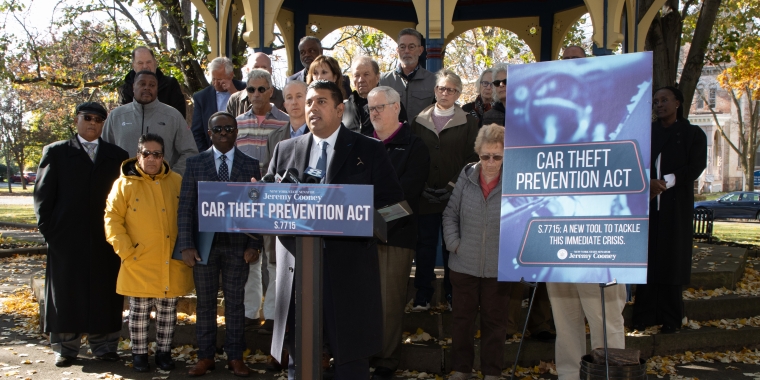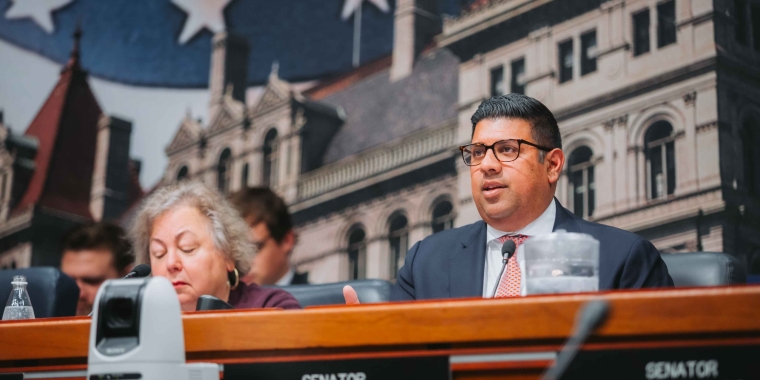
Faith-Based Organizations Can Be The Missing Piece To Alleviate Our Housing Crisis
April 17, 2025

Many faith organizations across New York are at a crossroads, struggling to continue to provide their critical community services like food pantries and homeless shelters. While many of these organizations are cash-poor, they are land-rich. But as housing and rent prices continue to rise statewide, outdated zoning policies restrict the ability of these organizations to build developments on their land. That’s why we need the Faith-Based Affordable Housing Act (S3397A/A3647), a common-sense solution to support our struggling faith-based organizations and to alleviate the housing crisis in Monroe County and across New York State.
Nearly 40% of New Yorkers renters are rent-burdened, meaning they spend more than 30% of their income on rent. Rochester is no exception. Over half of local renters are paying more than 30% of their income on housing, a figure that is unsustainable and a barrier to individuals’ ability to save and build generational wealth. But while the demand for affordable housing options is rising, faith organizations that could provide the solution are being restricted.
Several churches across our area are at risk of cutting programs or closing altogether. St. Luke and St. Simon Cyrene, commonly known as Two Saints, is the oldest public building in Rochester; however, rising maintenance costs and dwindling congregations have threatened these historic anchor institutions. And last month, the Episcopal Diocese of Rochester had to put St. Stephen’s Church on Chili Avenue up for sale. When churches close, it’s not just the congregation who suffers, it’s everyone who relies on these houses of worship for food pantries, childcare, homeless shelters, mental health counseling, and more. And it’s not just churches: temples, mosques, and all houses of worship provide similar services to the community.
A key way to keep these faith organizations afloat is for them to redevelop the land their houses of worship sit on. Many of these organizations have land or parking lots currently going unutilized, and while they want to build housing to meet the needs of the community, current zoning laws are preventing them from moving forward. Oftentimes these properties are located in residential areas that prohibit multifamily housing, or require strict parking requirements. Episcopal Churches in Rochester have run into this very predicament, being blocked from developing housing options despite the need from the community.
That’s why the Faith-Based Affordable Housing Act would be a win-win-win for faith organizations, those in need of housing, and our communities at large. Housing revenue provides a sustainable path forwards for these organizations to continue providing their life-changing work, and any housing development would be subject to property taxes just like any other housing development, leading to a revenue stream for municipalities. And a certain percentage of the units would have to be affordable, providing accessible housing options for all members of the community.
If we don’t act now and these organizations close, the parcels of land are at-risk of being taken over by private developers. If this happens, we have no guarantee that the land will be used for housing, let alone affordable housing. Keeping this land in the hands of the faith organizations is how we meet the needs of the community while contributing to our local economy.
This is the year for legislators to pass the Faith-Based Affordable Housing Act, a common-sense solution to support struggling faith organizations, alleviate our housing crisis, and bring tax revenue to local governments. We call on other faith leaders and members of our community to support this bill, and advocate for the kinds of zoning reforms that will make this a reality here in Rochester and across New York State.
Access to affordable, stable housing is how we combat poverty and bring about stronger outcomes for all members of our community. Rochester can be a model for faith-based affordable housing, but only if we make the changes needed in Albany to make this dream a reality. Passing this bill is about bolstering our local economy, meeting the needs of our neighbors, and upholding the values we as Rochesterians hold dear.
Jeremy Cooney represents the 56th District in the New York State Senate. The Rt. Rev. Kara Wagner Sherer is a Bishop with the Episcopal Diocese of Rochester.
Share this Article or Press Release
Newsroom
Go to NewsroomSenator Cooney 2023 Veteran Hall of Fame
November 10, 2023

Senator Cooney Introduces Car Theft Prevention Act
November 3, 2023


